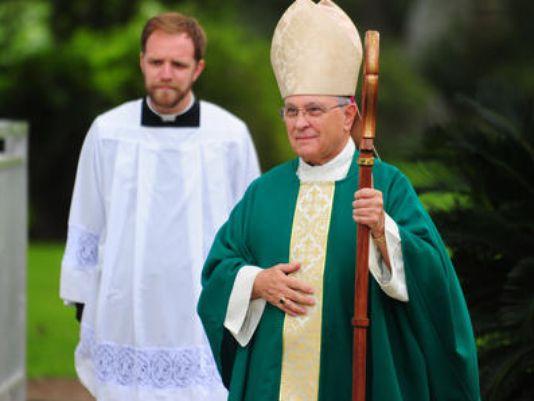|
Protect the innocent: Release the names
The Advertiser
In the face of demands from a victims’ advocacy group, Bishop Michael Jarrell continues to stand firm on his resolve not to reveal the names of 15 priests on whose behalf the Diocese of Lafayette and its insurers paid $26 million to the families of victims in sex abuse cases that spanned the 1980s and ’90s. In the place of information, representatives of the Survivors Network of those Abused by Priests and the media have received only reports of shoddy record-keeping, poor memories on the parts of investigating bishops and flat-out refusals. In response to questions from The Daily Advertiser, Jarrell would say only that seven of the 15 priests have died, five moved away and none are in the ministry. We do know that one of them is Gilbert Gauthe, the infamous convicted pedophile who is reportedly living in Texas since his release from jail. Another is the late David Primeaux, who committed suicide in 2012 in Virginia. That leaves seven of the 15 unaccounted-for and living anonymously among us. As Jarrell put it, it’s “almost impossible” to monitor their activities. And that is unsettling. It was decades ago, some reason — what’s the point of knowing who was involved in the incidents? The point is that these men were not caught shoplifting or cheating on their taxes. They were accused of molesting children. And these unindicted accused pedophiles could be coaching children’s sports or volunteering at any number of youth activities. They moved away from the Diocese of Lafayette? How comforting — as if it matters whether the children potentially at risk are in Lafayette, Los Angeles or Fargo, North Dakota. True, of the 15 none but Gauthe was convicted by a jury of their peers. But had they been innocent, would the diocese, through its attorneys and insurers, have paid out millions on their behalf? Possible. Not likely. So, why would church officials choose to shield them? It’s puzzling, in light of the fact that the U.S. Conference of Catholic Bishops declared in 2005, through the Charter for the Protection of Children and Young People, that the rights and well-being of victims and potential victims should be a priority. There are other ways to handle such matters. Consider the actions of officials at the Diocese of Lake Charles, under the direction of Lafayette native Bishop Glen John Provost. Provost, who was appointed as the Lake Charles bishop in 2007, is remembered by many as the scholarly pastor of Our Lady of Fatima Catholic Church, a man with a formal demeanor punctuated by a keen sense of humor. In 2011, when the Diocese of Lake Charles received a credible report from a man who said he had been sexually abused by a priest in the 1980s, diocesan officials notified the civil authorities. It was that simple. Former priest and current Duson resident Mark A. Broussard was arrested in 2012 and is out on $1.5 million bond, awaiting a January trial date. That’s how it should be. The Diocese of Lake Charles demonstrated it could put the welfare of victimes ahead of the protection of its own image. But so far in Lafayette, the diocese has handled requests for information by refusing to release the names in these cases or has asserted there are no records of their investigation in another. As a religious organization, the church is not subject to the same open records laws as government agencies. But as an organization that has authorized itself to conduct investigations into allegations of criminal acts, the church should also have taken on the same responsibility for accurate record-keeping and transparency as the agencies they seek to supplant. If these men had been turned over to the police and convicted, they would be required by law to register as sex offenders and their names would be available to the public. That law was passed by civil authorities to protect children. The church, whose mission is, at least in part, to minister to the most vulnerable among us, should do no less.
|
.
Any original material on these pages is copyright © BishopAccountability.org 2004. Reproduce freely with attribution.
